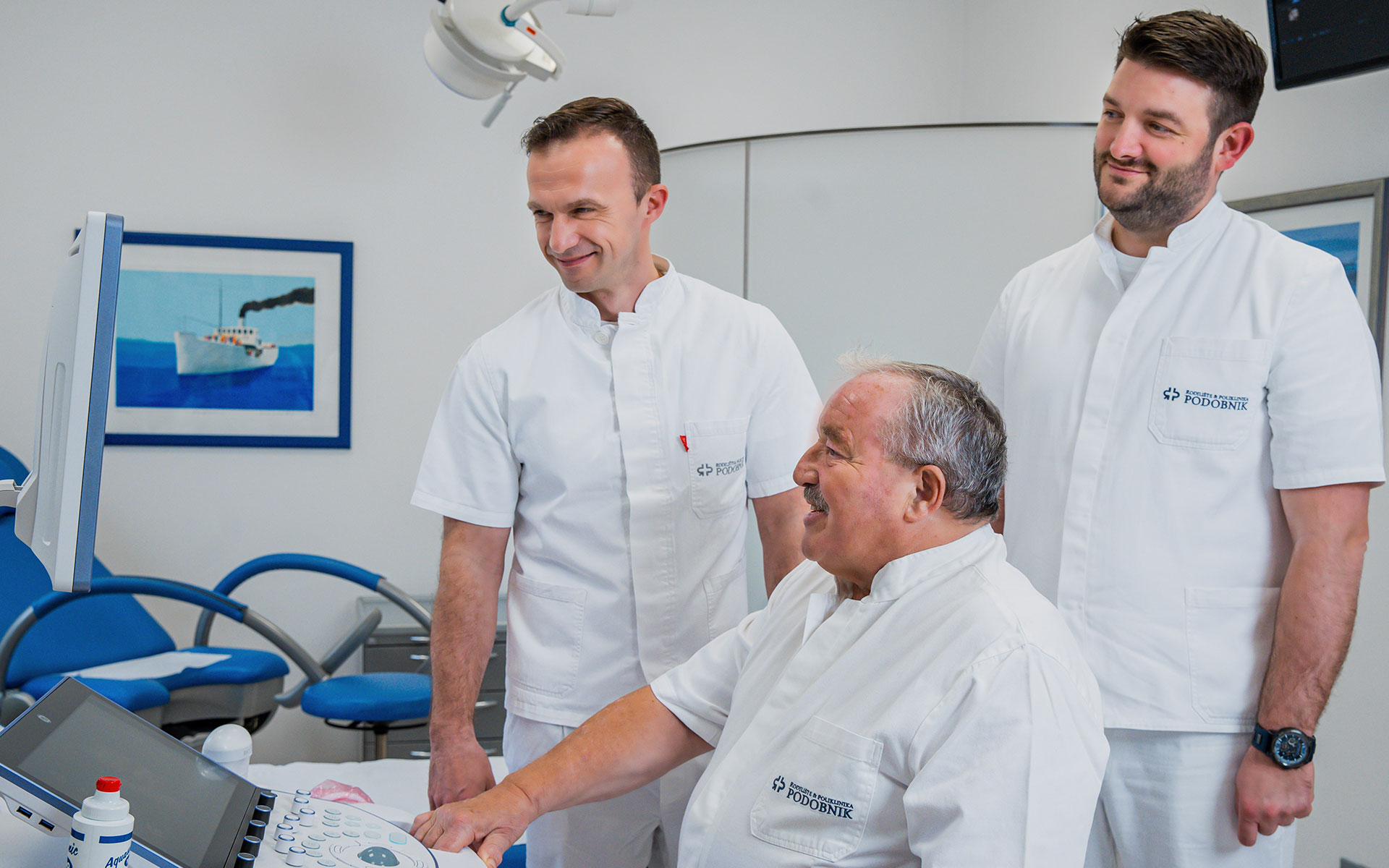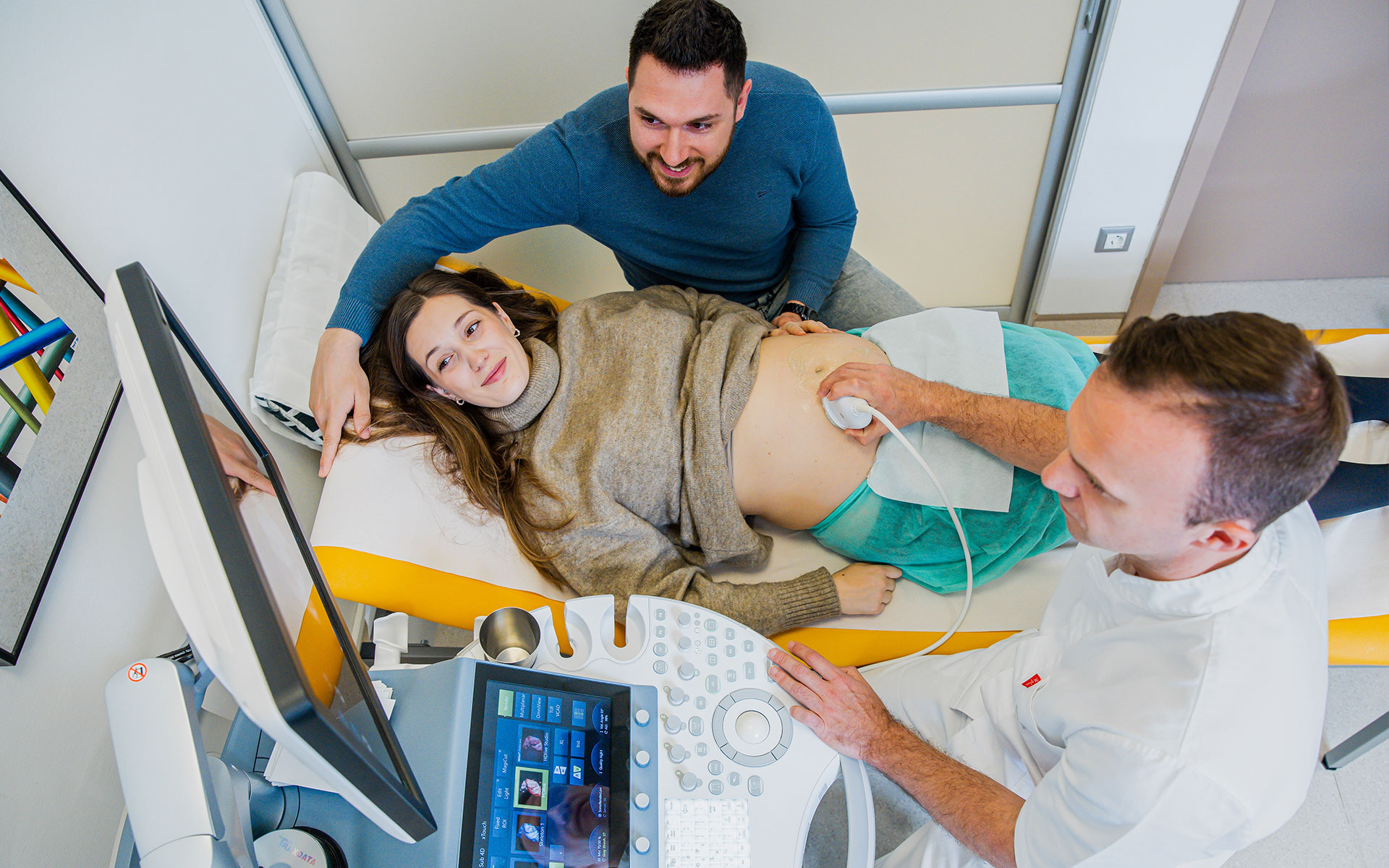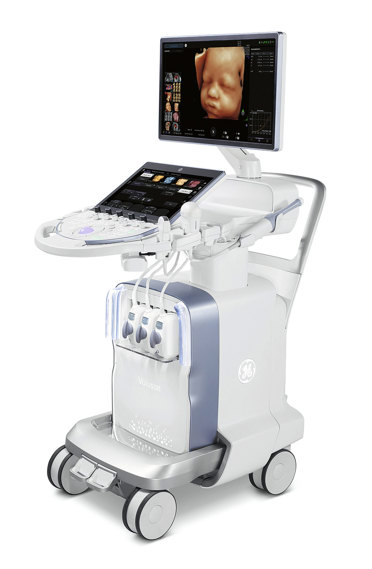Gynecology

Modern clinics
We have unified all services in the field of gynecology and obstetrics into four modernly equipped clinics. All our clinics have state-of-the-art 4D/5D Voluson ultrasound devices for precise diagnostics, and our team of experienced experts in the fields of fetal medicine, human reproduction and urogynecology can help solve any of your problems.
In all the phases and changes you go through, you can take care of your health accompanied by our experts from all areas of gynecology while in a pleasant atmosphere.
Unified Services
Together with reliable medical expertise and an individual approach with a lot of understanding, we offer comprehensive gynecological services that are essential for every woman to maintain her health: from regular annual preventive examinations to specific treatments of each of your gynecological conditions.
With the help of advanced ultrasound technology, an experienced doctor can detect changes in a woman's genital system early, before the first symptoms and signs of possible changes or conditions appear. Contact us with confidence and during preventive systematic gynecological examinations at Podobnik Special Hospital, prevent the early development of various cysts, tumors, polyps or cancers of the genital system and determine the reserve and function of the ovaries for timely pregnancy planning.

-
 the most advanced 3D ultrasound diagnostics
the most advanced 3D ultrasound diagnostics
-
 quick Pap test or cervical screening test results
quick Pap test or cervical screening test results
-
 emergency service available 24 hours in case of medical need
emergency service available 24 hours in case of medical need
-
 the possibility of continuing operative and hospital treatment
the possibility of continuing operative and hospital treatment
Services
Comprehensive preventive gynecological examinations are recommended for every woman from the moment of having sexual intercourse, but also earlier if there are certain gynecological problems. Each examination consists of a gynecological examination with the introduction of a speculum to check the cleanliness of the vagina, possible inflammation and changes in the vagina or cervix. The well-known Papanicolaou test (Pap test) is routinely performed for the purpose of cytological screening of changes on the cervix, which is also possible with the newer liquid cytology (LBC) method. The examination also includes ultrasound diagnostics, which determine the morphology and condition of the uterus and the function of the ovaries, as well as possible changes in the pelvis. Depending on the results, further examinations are recommended, in most cases at least once a year.
Diagnostics of sexually transmitted diseases and various inflammatory conditions of the vagina and vulva
In order to accurately determine the presence of microbiological agents, we perform a number of different tests in cooperation with the Institute of Microbiology in Zagreb and the Virion Institute.
Swab Culture - Aerobes, Anaerobes, Yeasts
- PCR molecular diagnostic method used to detect microbiological agents is an advanced diagnostic method that determines the strains present. This method is more precise than other methods helping to more accurately determine therapy if necessary.
- EXTENDED STD PANEL – Chlamydia trachomatis, Neisseria gonorrhoeae, Mycoplasma genitalium, Mycoplasma hominis, Trichomonas vaginalis, Ureaplasma urealyticum, Ureaplasma parvum
- GENITAL ULCER - Herpes simplex virus type 1, Herpes simplex virus type 2, Human alphaherpesvirus 3, Cytomegalovirus, Lymphogranuloma venereum, Treponema pallidum, Haemophilus ducreyi
- VAGINOSIS PANEL – Gardnerella vaginalis, Atopobium vaginae, Lactobacillus spp.**, Bacteroides fragilis, Megasphaera type 1, BV-associated bacteria 2*, Mobiluncus spp.**
- HPV PANEL – typing of 28 high-risk (HR) HPV types and 9 low-risk (LR) types
Depending on the test, the results are ready in 2 to 5 working days after taking the sample.
Pap test or Papanicolaou test or VCE smear (vagina-cervix-endometrium) is a quick, simple and non-invasive medical cytological test that involves collecting cells from the vagina, cervix and cervical canal, and serves primarily for the early detection of cervical cancer and changes that precede it. Considering the sensitivity of the method, the Pap test is recommended to be done once a year, and more often depending on the results.
LBC (liquid based cytology) - a new method of cytological examination - BD SurePath liquid cytology (Pap test) for earlier and more accurate detection of cervical changes.
All results are obtained within a week; the doctor then explains them to you and, if necessary, prescribes treatment.
If the cytological smear (Pap test) shows changes on the cervix, the next steps in the treatment are colposcopy and targeted biopsy of the affected part of the cervix. We send such a sample for pathohistological analysis (PHD analysis), which is the final diagnosis of changes on the cervix. The results indicate possible further treatment or only check-ups. Colposcopy and biopsy are usually performed on an outpatient basis, and if necessary, the procedure can also be performed in the operating room under anesthesia. When the results are obtained after approximately 7 to 10 working days, we will notify you of the results and recommend further procedure.
If a medical need is indicated or there is a menstrual cycle disorder, hormonal therapy can be adapted to every woman at any stage of her life.
Oral hormonal contraception is a successful method for pregnancy planning, it can be prescribed after a regular gynecological examination if the laboratory results are normal, and the doctor adapts it to each patient individually, in accordance with her health, wishes and needs.
In addition to hormonal contraception, we also insert spirals or intrauterine devices (IUDs) - hormonal (Mirena and Levosert) or copper ones. Insertion and/or removal of the intrauterine device is usually performed on an outpatient basis, but if there is a medical need or the patient wishes to do so, we also offer the possibility of performing the procedure in the operating room under short-term general anesthesia.
HYSTEROSCOPY is a diagnostic method that has become the "gold standard" for diagnosis and treatment of changes in the uterine cavity. Outpatient hysteroscopy is an almost painless method that does not require anesthesia or analgesics. The procedure is performed using a thin instrument with a diameter of up to 5 mm, which has a camera at the top, i.e. a hysteroscope. The hysteroscope is introduced through the birth canal and cervix into the uterine cavity expanded with fluid.
Indications for hysteroscopy are suspected endometrial polyps, adhesions, submucosal myoma, anomalies of the uterus (septum), unexplained infertility, previous multiple abortions, retained intrauterine device, etc.
Outpatient (office) hysteroscopy is recommended to patients as preparation for the IVF procedure, especially after several unsuccessful embryo transfers. With this procedure, adhesions and smaller polyps can be removed, and endometrial scratching and endometrial biopsy can be performed for microbiological or pathohistological analysis.
The procedure is performed in the first phase of the cycle, immediately after the end of menstruation, while the mucous membrane is still completely thin. Prerequisites for the procedure are a normal Pap test and cervical smears, not older than one year. During the procedure, slight uterine spasms are possible, which can cause short-term pain similar to menstrual cramps and light bleeding. After two to three days, when the bleeding stops, the patient can have sexual intercourse. Recovery after the procedure is extremely fast, and the patient can immediately return to daily activities.
Ultrasound hysterosalpingography (Sono-HSG) is a safe, simple and almost painless diagnostic procedure for testing the patency of the fallopian tubes. During a classic ultrasound examination, the fallopian tubes are not shown, unless they are enlarged due to various pathologies (most often inflammation). During the procedure, the fallopian tubes are filled with a contrast material, which can be saline, but in the Podobnik SH we use a special foam (ExEm Foam) for this purpose. In addition to HSG, the patency of the fallopian tubes can also be tested during laparoscopy, but this is done only when there are other indications for a laparoscopy. The indication for tubal patency testing is the inability to achieve pregnancy within a year of regular unprotected intercourse in women who are candidates for targeted intercourse or insemination. The procedure is performed in the first phase of the menstrual cycle (most often the 7th-12th day of the cycle), without anesthesia and under ultrasound control. Prior to the procedure, a PAP test and cervical smears need to be carried out, which should have no abnormalities detected. If the examination shows proper patency of the fallopian tubes, targeted intercourse or insemination can be planned, and a higher frequency of spontaneous pregnancy within 6-12 months after the procedure has been confirmed. However, patency of the fallopian tubes does not rule out damage or some other cause of infertility. Therefore, if there is no spontaneous pregnancy, further in vitro fertilization procedures should be considered.
Medical termination of pregnancy is a non-invasive method of terminating pregnancy at an early stage (abortion) with the help of drugs (so-called 'abortion pills'). It is used in cases of evacuation of a pathological pregnancy that is not developing well or in cases of intentional termination of pregnancy. Before the procedure itself, the doctor will confirm the pregnancy inside the uterus and the exact duration of the pregnancy with an ultrasound examination. The method is carried out by taking two different medicines in the presence of a doctor, during two visits. During the first visit, the first medicine is taken - Mifegyne, and after 36 to 48 hours, the patient comes to continue the therapy and stays in the hospital for 6 to 8 hours, if necessary, longer. During that stay we monitor the patient’s condition and bleeding, and if necessary, we give the patient medicines for pain, nausea and vomiting. Given that the drugs used may only be given in hospital conditions, Podobnik Special Hospital is the only private institution in Croatia that, along with state hospitals, is licensed to carry out the method according to the correct protocol. If the entire pregnancy is not evacuated, it is necessary to perform an instrumental vacuum aspiration of the uterus, which is performed in the operating room under short-term intravenous anesthesia.

US in gynecology
Specijalna bolnica Podobnik Vam nudi preglede najsuvremenijim 4D/5D ultrazvučnim aparatima te jedina u Hrvatskoj ima u svim ambulantama samo vrhunske uređaje visoke rezolucije GE Voluson.
3D ultrazvuk upotrebljava se za iznimno kvalitetnu dijagnostiku svih ginekoloških stanja kao što su anomalije reprodukcijskog sustava, dobroćudni i zloćudni tumori maternice, ciste i tumori jajnika, polipi endometrija, izvanmaternična trudnoća itd.
Primjena 3D power dopplera u ginekologiji omogućuje trodimenzionalni prikaz krvnih žila ne samo organa ženskog reprodukcijskog sustava već i ginekoloških tumora, te predstavlja novu izvanrednu mogućnost u ranom razlikovanju prirode tumorskih tvorbi. Svakako je bitno da pregled obavlja iskusni ginekolog sa velikim iskustvom s problemima genitalnog sustava kako bi se postavila prava dijagnoza.
Gynecologists at the Podobnik Special Hospital have many years of experience in ultrasound diagnostics. After completing a specialized course in 3D/4D ultrasound diagnostics in Vienna and gaining many years of experience during clinical work, they have become educators who have trained many doctors in Croatia and neighboring countries thanks to their knowledge and experience.

